
GAMES was a puzzle magazine initially spearheaded by Will Shortz, who found fame as a crossword editor for the New York Times. It still lives in an extremely-truncated incarnation, minus any of the innovation, ingenuity, or imagination that made it great. In its heyday, it went beyond Penny Press crosswords and word searches to offer full-color photo mysteries; papercraft puzzles you had to punch out of inserts and assemble yourself; contests - some whose instructions and very existence were hidden in puzzles - for which the winners were awarded a prestigious GAMES T-shirt. (I had three.) It paid for and incorporated original art and photography into puzzles; it routinely created entirely new types of puzzles and even board games that could be played with player-made or provided printed-paper counters. Even classic puzzles distinguished themselves with more inventive clues incorporating wordplay or betrayals of expectations requiring an additional level of thought, or new twists (such as the World's Most Ornery Crossword, which offered two sets of clues - one easy, one hard - for the same grid, with solvers folding the page one way or the other to choose between them). It even included news articles on upcoming games and puzzle-based contests, plus features on pastimes such as D&D, mah-jongg, go, and orienteering. I cannot underline enough the care and inspiration immersed in the production of the magazine. It wholly lived up to its tagline: "For Creative Minds at Play." I loved it.
One of GAMES' ongoing features consisted of reviews of board games, with the best-regarded honored in an end-of-year feature called "The Games 100." Eventually, the review team's scope expanded to include what the magazine deemed "electronic games" with the medium's rise to prominence and crossover with the content and audience for traditional puzzles and board games. When Myst was awarded Game (paper or electronic) of the Year in 1994, this apparently caused a big controversy among the readership and editorial staff, leading to the formation of the Electronic Games 100 and GAMES getting into reviewing video games in earnest.
The Electronic Games 100 is fascinating from a modern standpoint, as its priorities and awards criteria are utterly alien. It's written by and for people who would enjoy the mental challenge of gaming but were of a markedly different demographic than EGM: more mature; better-heeled and more likely to own the nineties' extravagance of their very own PC (the PC Master Race mentality is in full force here); not as well-versed in video games as a medium, and decidedly not familiar with its conventions or history. This leads to some pretty...different awards.
We're starting with 1996, the first issue I found in my collection of old magazines that are preserved just absolutely superbly. 1996 was the year of: Super Mario 64; Tomb Raider; Diablo; Quake; Resident Evil; Super Mario RPG; and the first installments of Pokemon. This wasn't as big a year as the ones preceding or following, but those are some landmark titles. What, then, is the game of the year?
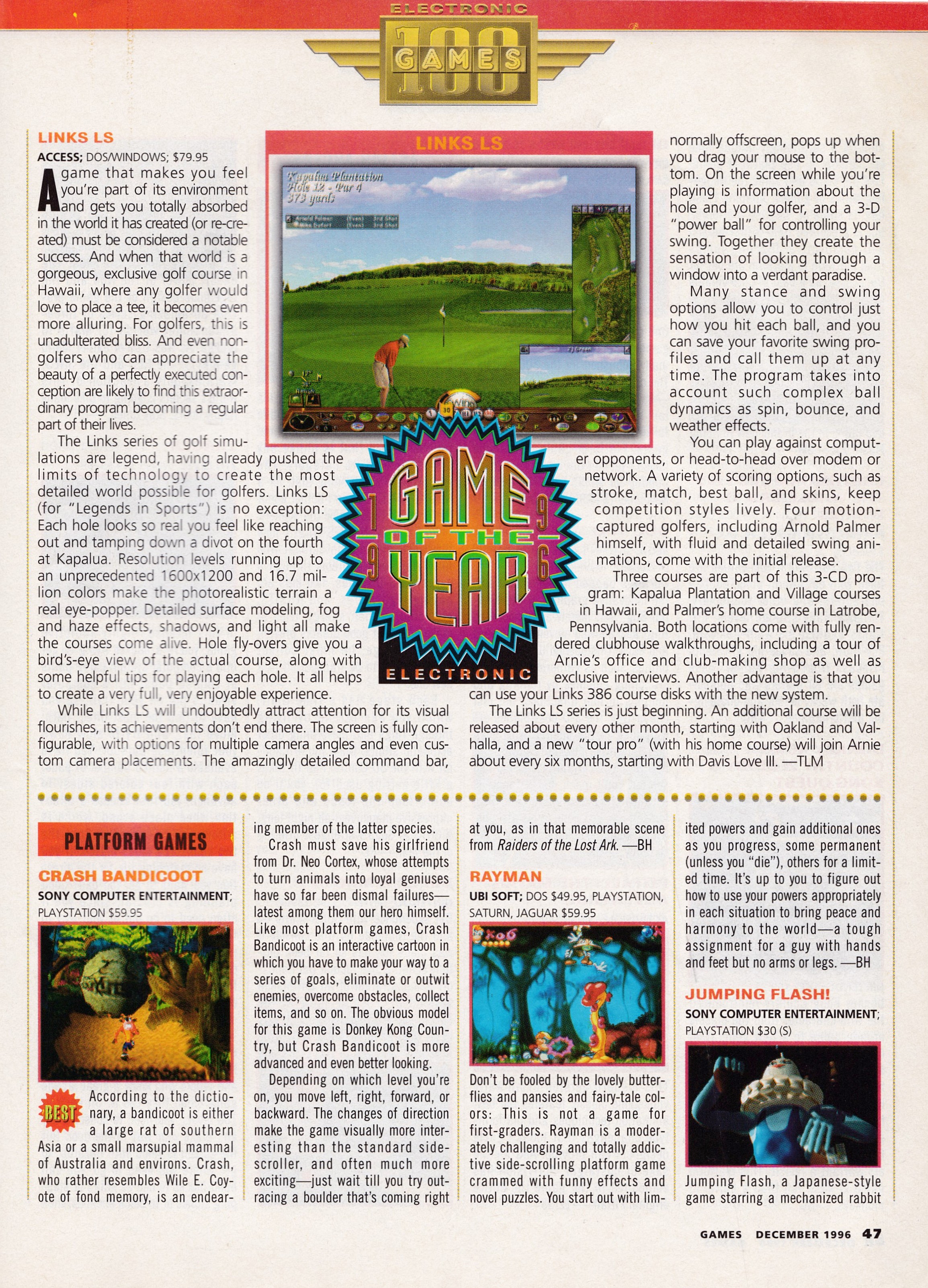
Now, I have no experience with golf games beyond a copy of the Genesis Arnold Palmer Tournament Golf that belonged to another member of the household, so maybe Links LS really was revolutionary enough to merit this award. (I note, though, that we hear absolutely nothing about it today, unlike, say, NHL '94 - though how much of that can be chalked up to the truly abysmal state of PC game preservation, who can say.) GAMES lauds the title primarily for the allegedly lifelike presentation of the course (1600 x 1200 resolution!) and the game's full complement of player-friendly features: some downright mundane by today's standards (mouseover pop-up menus, camera control), some seemingly genuinely innovative even today (customizable swing loadouts), some the mark of the multimedia infatuation of the age (video interviews! tours of Arnie's real-life office!).
I'm tempted to conclude, though, that it got the nod at least in part by being an electronic rendition of a suitably adult pastime in a multimedia presentation sufficiently sophisticated so as not to be embarrassingly kiddish, unlike those cartoony hop 'n' bop console platformers. (Also: because someone really liked golf.) I recall Phil Salvador talking on the HG101 podcast episode on Sim Golf, a title in the same wheelhouse, about how it was created out of Maxis's perceived need at the time to appease stockholders by appealing to a broader customer base. There is, evidently, a significant gap in execution between the titles, but: the idea of a CD-based, multimedia-heavy sim aimed at older execs who loved golfing is considered a curiosity and misfire by a mainstream gaming podcast. Here, it's Game of the Year. That gives you a good idea of what to expect as we move forward.
(Also, warning: some of these pages are going to be slightly tilted, as I have limited patience for scanning images. If it doesn't come out semi-acceptable the first time, it's the most orthogonal of three attempts, and that's it.)
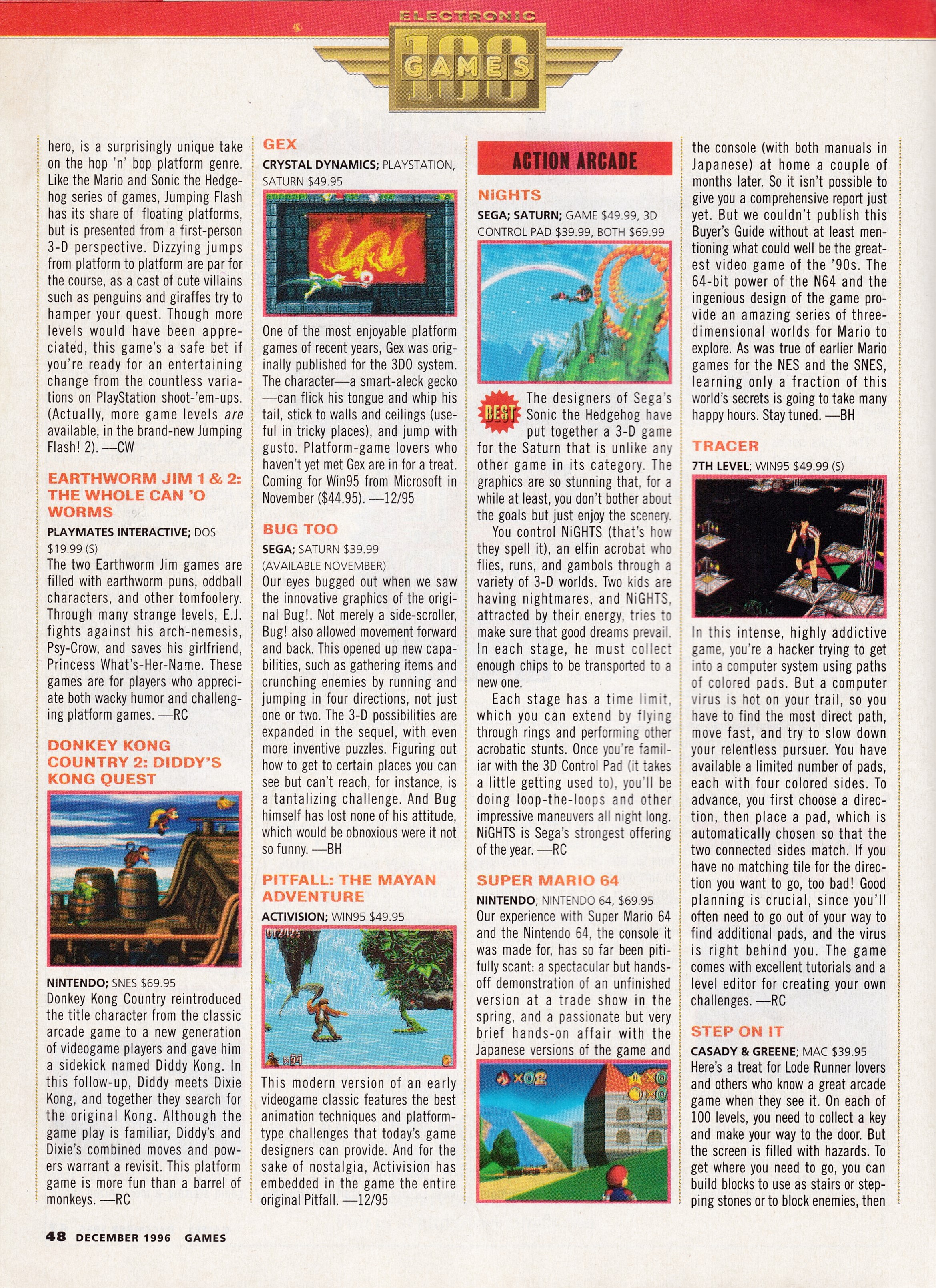
Spotlights on Gex and Bug! titles. Truly signs of the times. Franchises that were the faces of their respective consoles at the dawn of the 3D era and just fell off the map afterward, seemingly contributing nothing to the evolution of the genre or medium. GAMES, like many other publications, was sufficiently impressed at first.
In a similar vein, we have NiGHTS, which is better-respected and recognized as more creative that the likes of Gex nowadays but has seen its star fall considerably from its heyday. GAMES takes the quite controversial step of placing it above Super Mario 64. From their perspective, I can actually see it: NiGHTS was very-overtly technically impressive and unusual, in a way that was less kiddy than Mario and, in GAMES's eyes, perhaps better accentuated the 3D. (After all, flying is reserved for special occasions in Mario 64, but in NiGHTS, you're flying all the time!) It also had a higher profile when 3D was in its infancy and the Saturn was a major platform and not the relative obscurity (compared legacywise to the PS1 and even N64) it is today. NiGHTS wasn't just offering 3D (though that was more than enough to secure fame & fortune for a title) but doing something aesthetically playful and imaginative with it; it features a theme of childhood, which resonates more with adults looking back fondly to it than teenagers and college-age players trying to distance themselves from it, and it has impressive natural environments that are more respectable to and play better with a mature audience. All of this would have made it resonate better with the GAMES crew.
The entry, however, mentions that they barely played Mario 64. They cite the magazine's deadline and its proximity to the game's release date. Mario 64 was out in late September; judging from the "Display until" info on other issues, GAMES were typically pulled from stands the second week of their display month, so this would have been available for sale the second week of October, going to press shortly before that, I suppose. This resolves some questions but also reveals how atypical the assumptions were behind GAMES's review process: that it would be OK to put out a year-end review before the holiday releases; that Mario's 3D debut wouldn't be an absolute must-play. (The reviewer mentions fooling with a Japanese copy of the game but still, despite their "could well be the greatest video game of the '90s" line, didn't think it essential to get it played in some form before GotY - something that would be unthinkable at any other outlet.) It demonstrates how little care this team had for conventions, or knowledge of them.
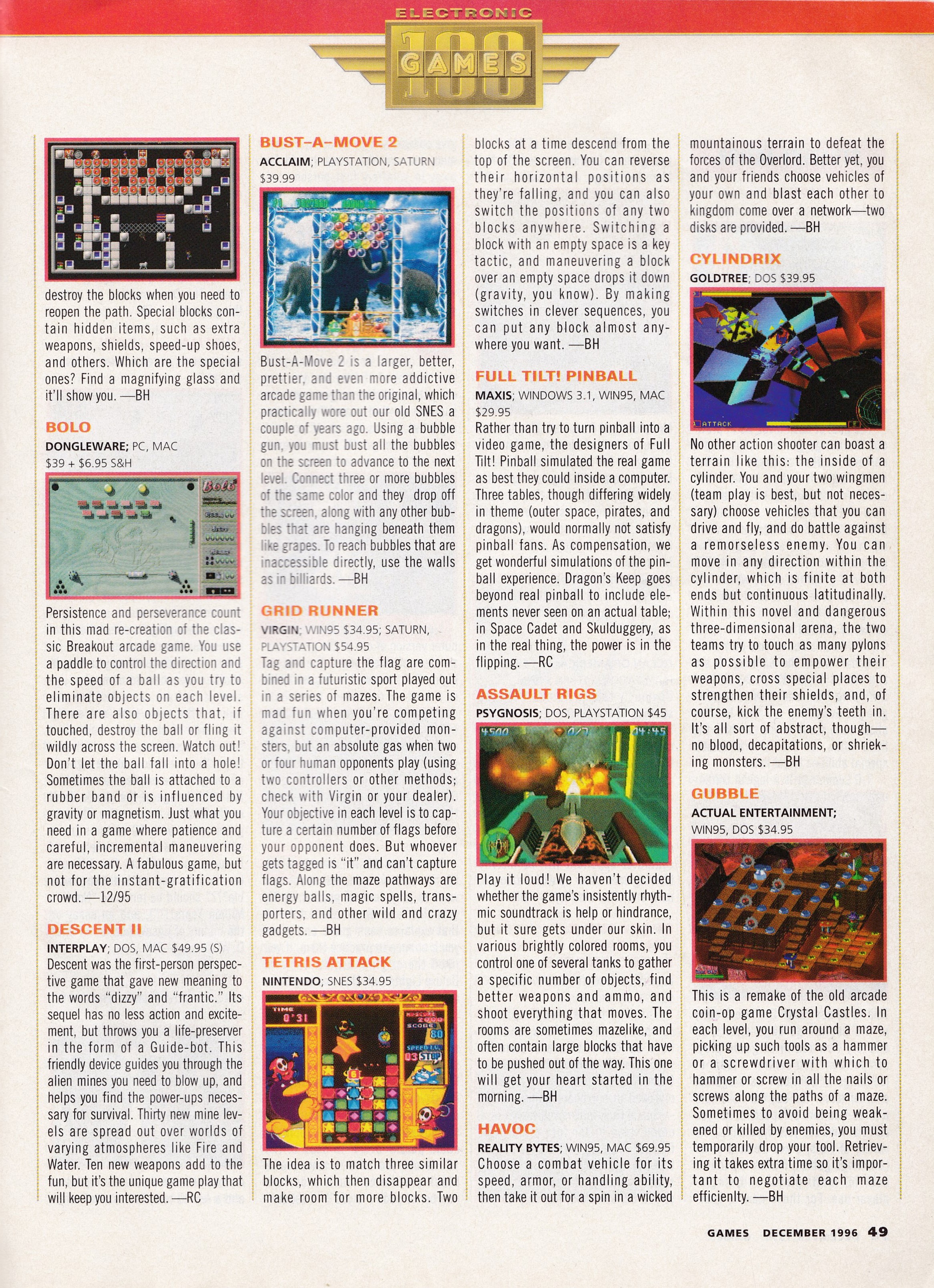
If you've been following the genre labels, you might have questions at this point. We're in the "Action Arcade" section, to which NiGHTS and Mario 64 were somewhat-understandably assigned on the previous page - but now we have Tetris Attack and Bust-a-Move 2 put in the same category. The only criterion for "Action Arcade" seems to be "requires quick reactions and hand-eye coordination." This is far from the strangest categorization choice, as we shall see.
I have no experience with Bolo, but, man, look at that price. $39 (+ $6 shipping) for what sure as heck seems from that screenshot like a shareware title. That's GAMES for you, though: very egalitarian. It was all about gameplay with them - provided that gameplay wasn't on a console or didn't come across as too kiddie, of course. And if another title did a certain type of game or mechanic better, they wouldn't always have the breadth of knowledge in the medium to be aware of that.
Notably, the selection of "Arcade Action" games includes Gubble, known mainly for its Game Grumps video.
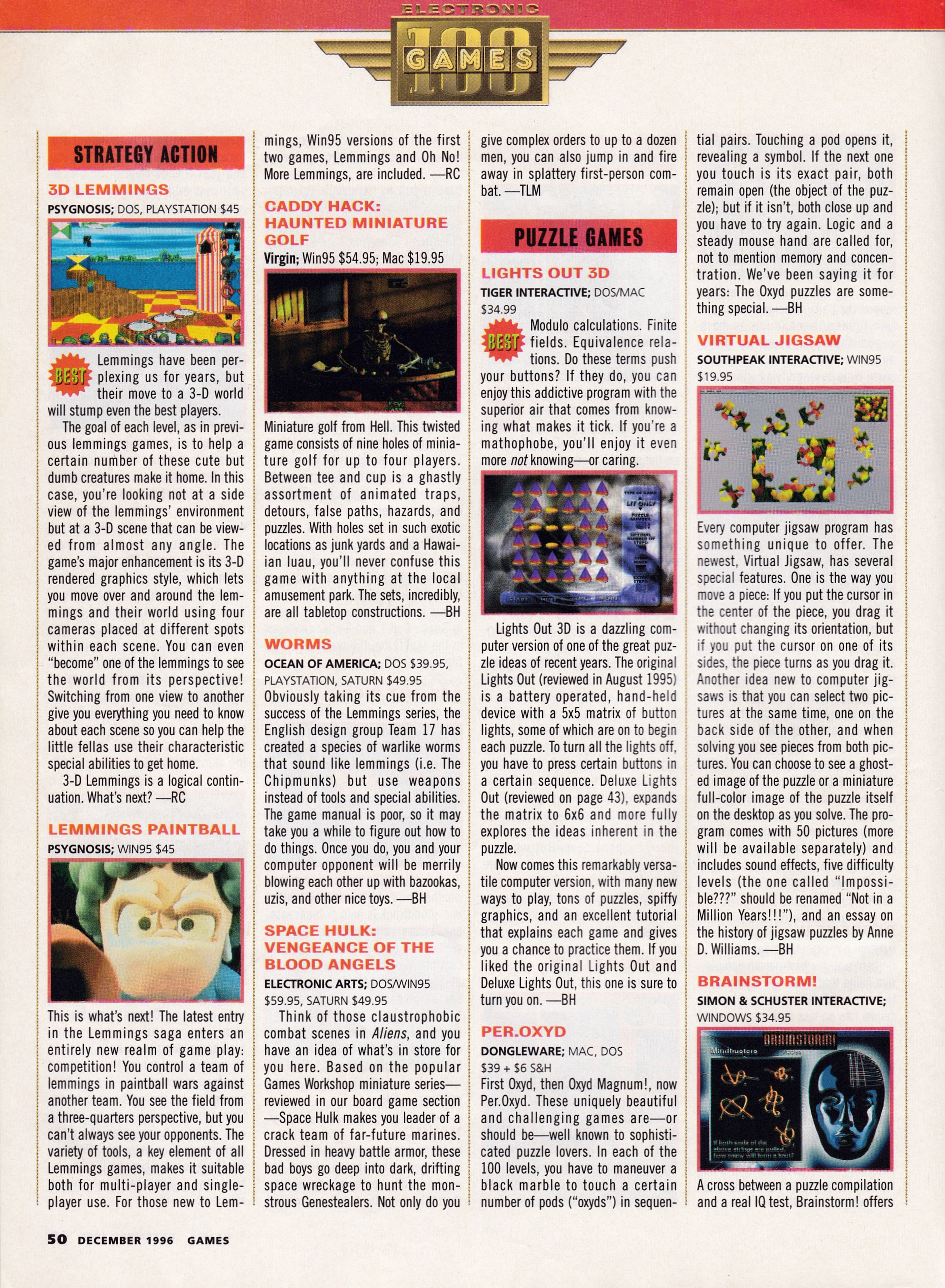
Here we see the creation of the currently-unknown "Strategy Action" category, which seems to be defined by Lemmings and consist of games that have strategic and puzzle elements and focus on organizing & directing resources but also include some elements of timing. Also, mini golf. (Odd that mini golf was classified as Strategy Action but Gubble wasn't.)
The best digital puzzle game of 1996 to GAMES was a digital version of freaking Lights Out, the bane of any adventure gamer, second only to those freaking sliding block puzzles. Again, for GAMES, it was generally about just whatever they enjoyed; they didn't always care that much for innovation or technical presentation, except when those aspects were overwhelmingly impressive to a layperson. I know this sounds like an elitist complaint - look at them, going on enjoyment, those weirdos - but the picks here illustrate the problem when the judges of a given medium have no sense of what's significant, ambitious, or groundbreaking.
Also, remember: Tetris Attack and Bust-a-Move are not puzzle games. I presume that this is because both have an element of timing and demand quick reactions. The Lights Out and jigsaw titles (we're in an era where the very existence of a digital jigsaw puzzle program is awards-worthy, apparently) here presumably have no time element.

The first incarnation of the You Don't Know Jack franchise warhorse is almost an afterthought on the Puzzle list. (Also, I see from where they're coming in that YDKJ, like other titles in this category, is a purely intellectual challenge, but it's more trivia/party than puzzle, really.)
The Puzzle category includes two titles whose gameplay evidently consists of one big, interconnected visual riddle whose completion either constitutes entry in some form of contest or leads to treasure in the real world. In picture-book form, those used to be all the rage when I was a kid, in the mid-'80s. The one I had was Treasure, about a girl roaming the world in search of her lost horse. I remember loving the story and its bizarre puzzle imagery despite, obviously, never closely to solving the riddle, being in elementary school and all. The prize was a golden statue of a horse worth $500,000 that the had hidden in the Statue of Liberty. No one found it by the contest deadline. Lord knows how they hid a gold horse in the Statue of Liberty and had no one accidentally come across it for a year.
Meanwhile, in Action Adventure, Duke Nukem reigns supreme. Despite being an action-oriented category, most of the winners are still PC titles, illustrating the heavy PC bias here.
The famed Resident Evil protagonists, A Man or A Woman.
We come to the question of how they're distinguishing Action Arcade from Action Adventure games. The existence of points? No. Levels? No. Saving? No. Item use? No.
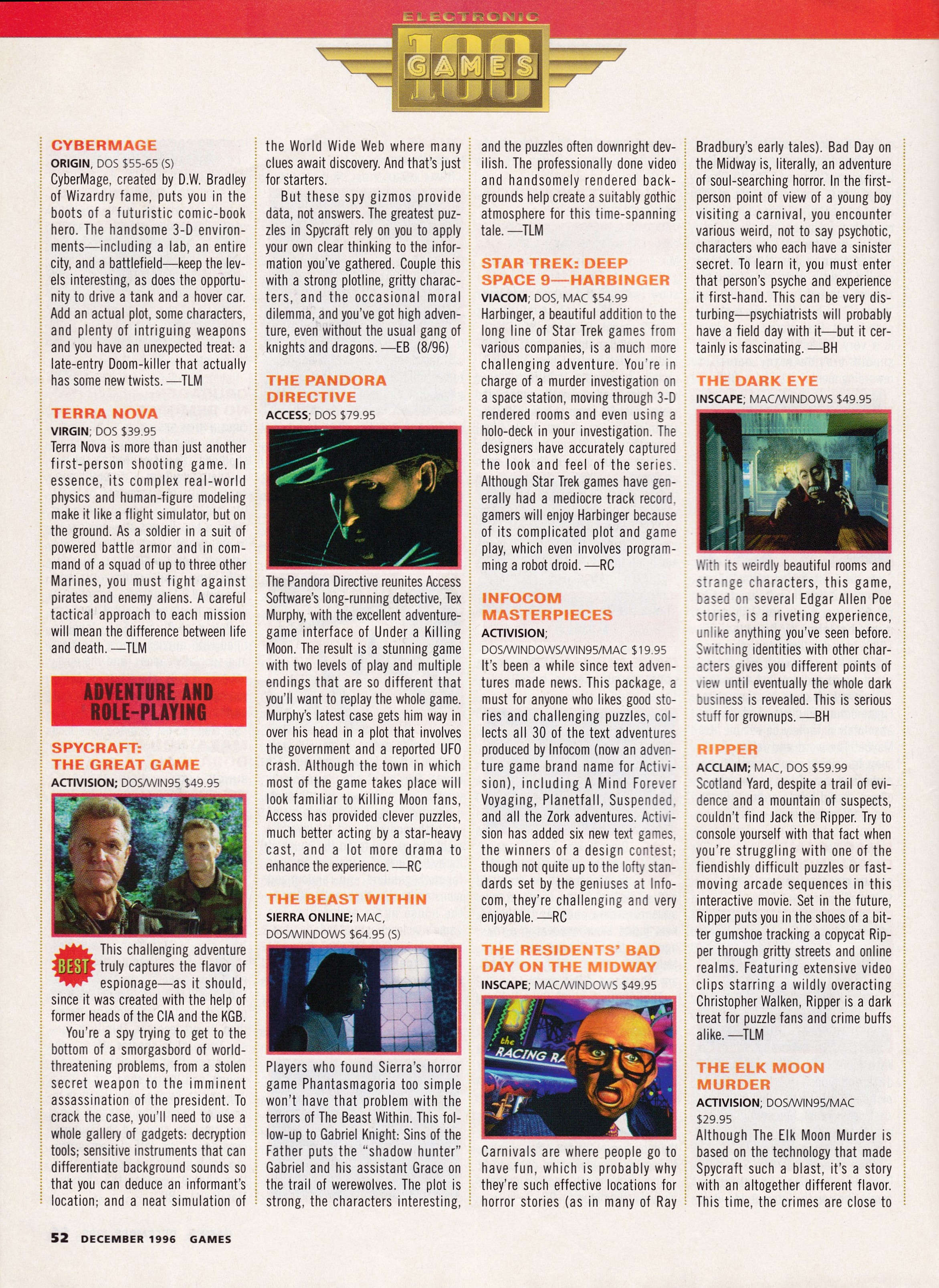
FMVinny stalwarts Spycraft: The Great Game and Ripper make appearances here. After seeing the Nextlander LP, I'd give Ripper more leeway than many do, but its puzzles are pure garbage; it got here solely on the strength of FMV and the novelty of its cast. (Admittedly, Christopher Walken is a big selling point, no matter how much effort he's putting into his performance.) From the hour for which Vinny Caravella played it, Spycraft seems another product of the multimedia infatuation at the dawn of the CD age, using then-amazing newfangled computer capabilities to play a spy in something not a million miles removed from a Tom Clancy thriller. Play audio files forward and backward! Sharpen up photos of license plates so you can see the numbers! That level of image processing isn't available in 1996, but it's fun to pretend! Search fake databases in something approximating that "World Wide Web" about which you've heard on America Online!
Extremely weird to see an Infocom compilation here - not honored, just it existing. PC very rarely cared about its history at this point. On that note: how many of these honorees are nigh-inaccessible in the modern market? There are some well-known names in the genre represented here - Tex Murphy, Gabriel Knight - but when I went to investigate The Elk Moon Murder, a seemingly-intriguing FMV mystery set in the southwest with Native American actors, I found next to nothing on it. I can download the files and fiddle with DOSBox, but we all know how well mixing 25-year-old PC exclusives with modern resolutions and processor speeds works out. Meanwhile, on the console side, I can play freaking Psycho Dream at the snap of my fingers, but it seems like anything PC that's not landmark has just disappeared off the face of the earth. (GOG's got your back for Spycraft, though.)
Incidentally, RPGs and adventure games are two pretty big genres for the PC platform to be lumping together, GAMES.
We interrupt this feature for a message from its sponsor:

Back to our regular programming.
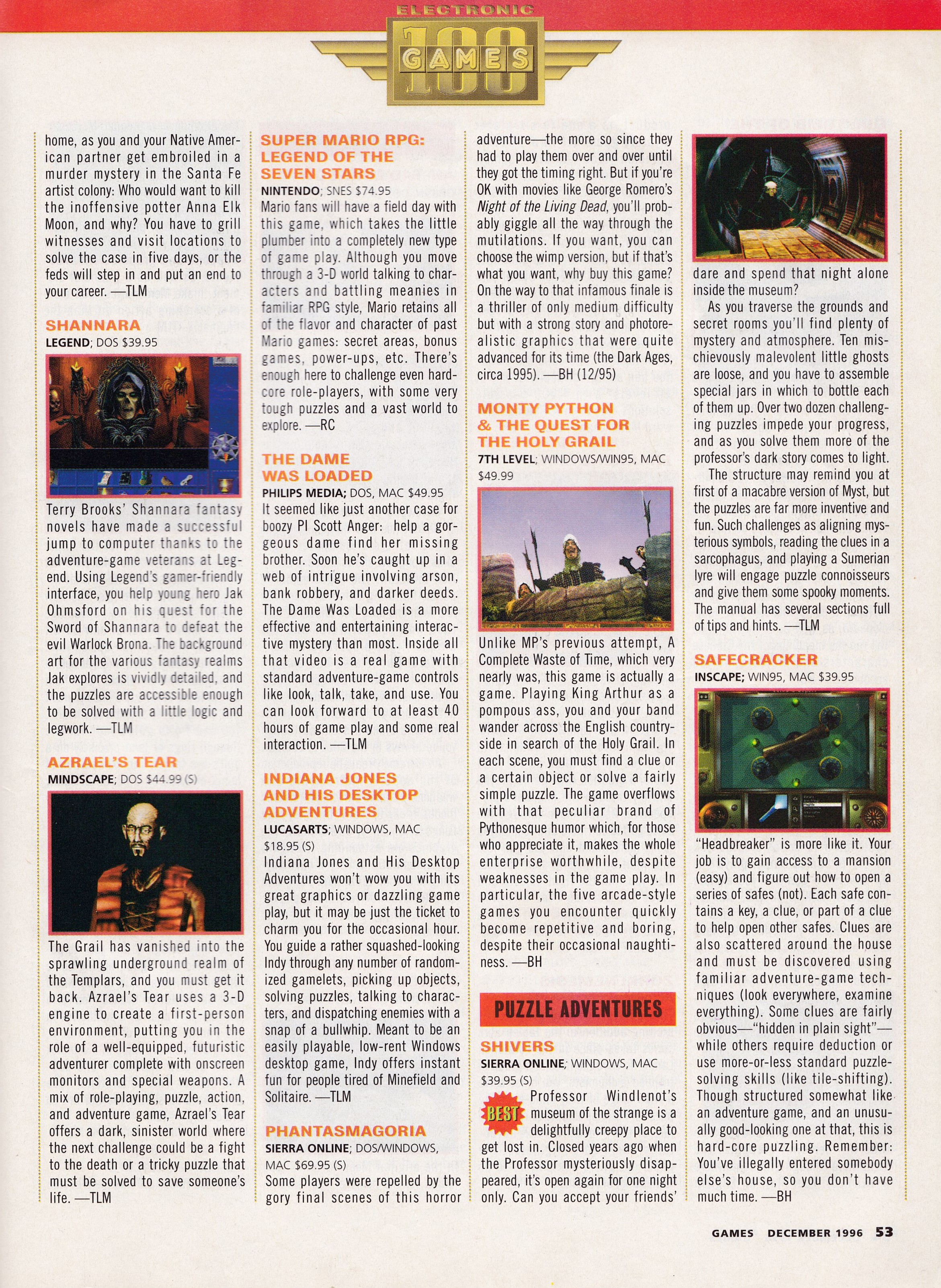
It's surprising to see Mario RPG here, as console games, much less console RPGs, rarely got any traction in the year-end awards. Strange that the reviewer considers it notable largely for its allegedly-high difficulty, given it was designed and renowned largely as an easier, more-accessible gateway to the genre.
Super Mario RPG and Monty Python & the Quest for the Holy Grail? Same genre. Definitely. Also, Indiana Jones and His Desktop Adventures is an action game and should be in either of the two preceding categories.
Phantasmagoria is also included, despite it coming out in 1995 and winning this category the previous year. GAMES occasionally did this with past honorees - give up a slot in a category to something that didn't even come out in the given year as sort of a "still a best bet, even one year on" thing. The awards are not meant as an ongoing "here are the best games of these bizarrely-classified genres at this point in time" or to say that every honored game in a given year is better than ever honored game in the previous year, so I'm not entirely sure how certain past winners were chosen for this honor. To signal that it was still a major going concern and still in the zeitgeist, so to speak? But then, there are many mysteries with the judging here.
We also see here the debut of the "Puzzle Adventure" category, and it's anyone's guess why Shivers is not in Adventure & Role-Playing with Phantasmagoria.
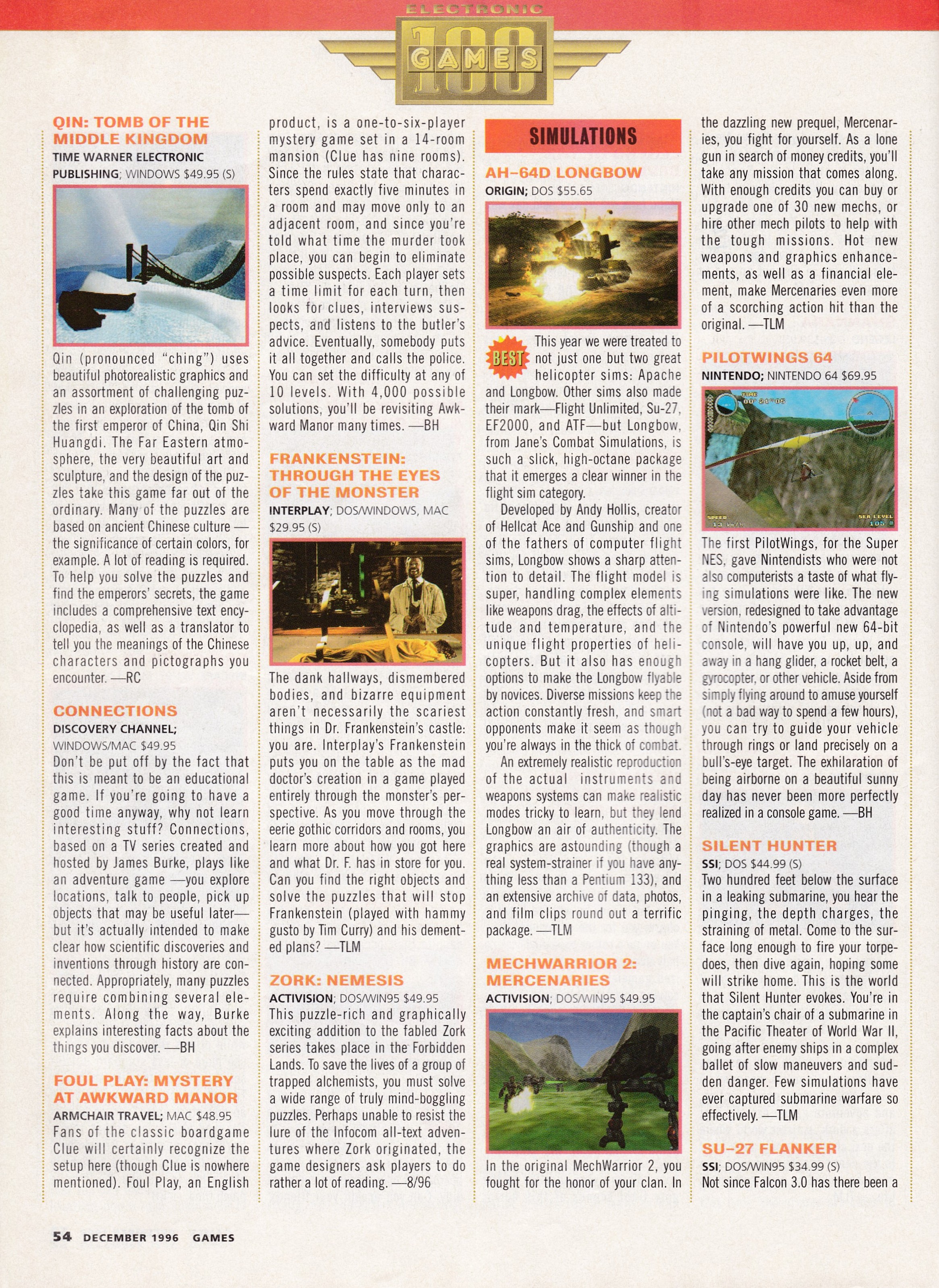
Or Frankenstein or Zork: Nemesis. I entertained the idea that the Puzzle Adventure category was for titles like The 7th Guest where the environment serves as just a fancy showcase for standalone, self-contained puzzles rather than King's Quest "pluck carrot from ground and use to lure goat several screens this-a-way to troll several screens that-a-away" business, but as I recall from what I viewed of supergreatfriend's playthrough before the narrative started revolving around regurgitated chicken and I had to quit watching, Frankenstein is in the standard adventure mold. Zork appears to be the same. It's only going to get more confusing from here, so let's move on.
Before we do, though: "Nintendists." That sounds like a slur. (That's an apt summary of Pliotwings' appeal, though: "the exhilaration of being airborne on a beautiful sunny day.") You'd think Simulation would contain more titles, but GAMES considers Simulations to be restricted solely to piloting some sort of vehicle.
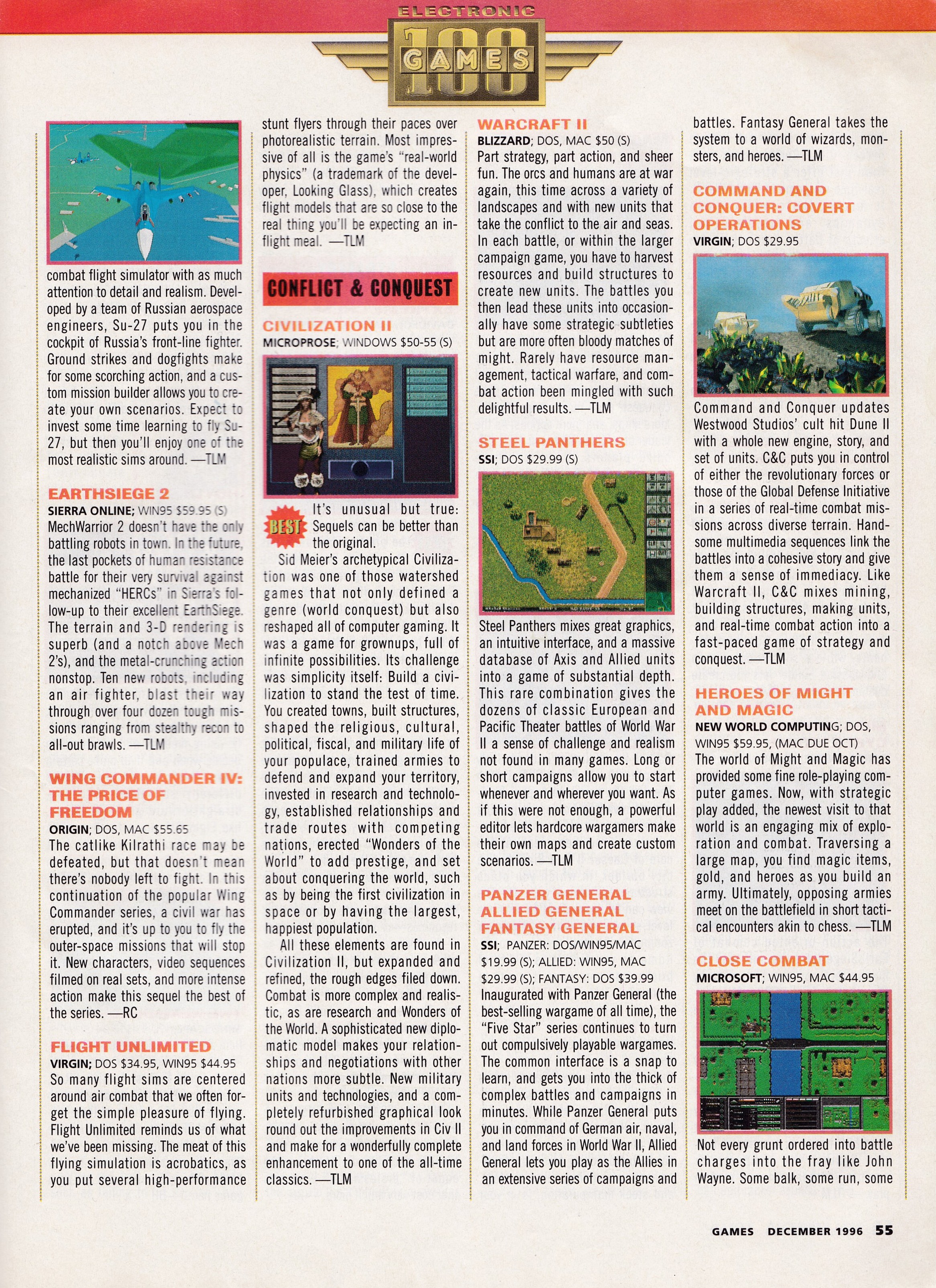
Much of what we would deem sims today is in the "Conflict & Conquest" category, or I guess the War Sim & 4X category.
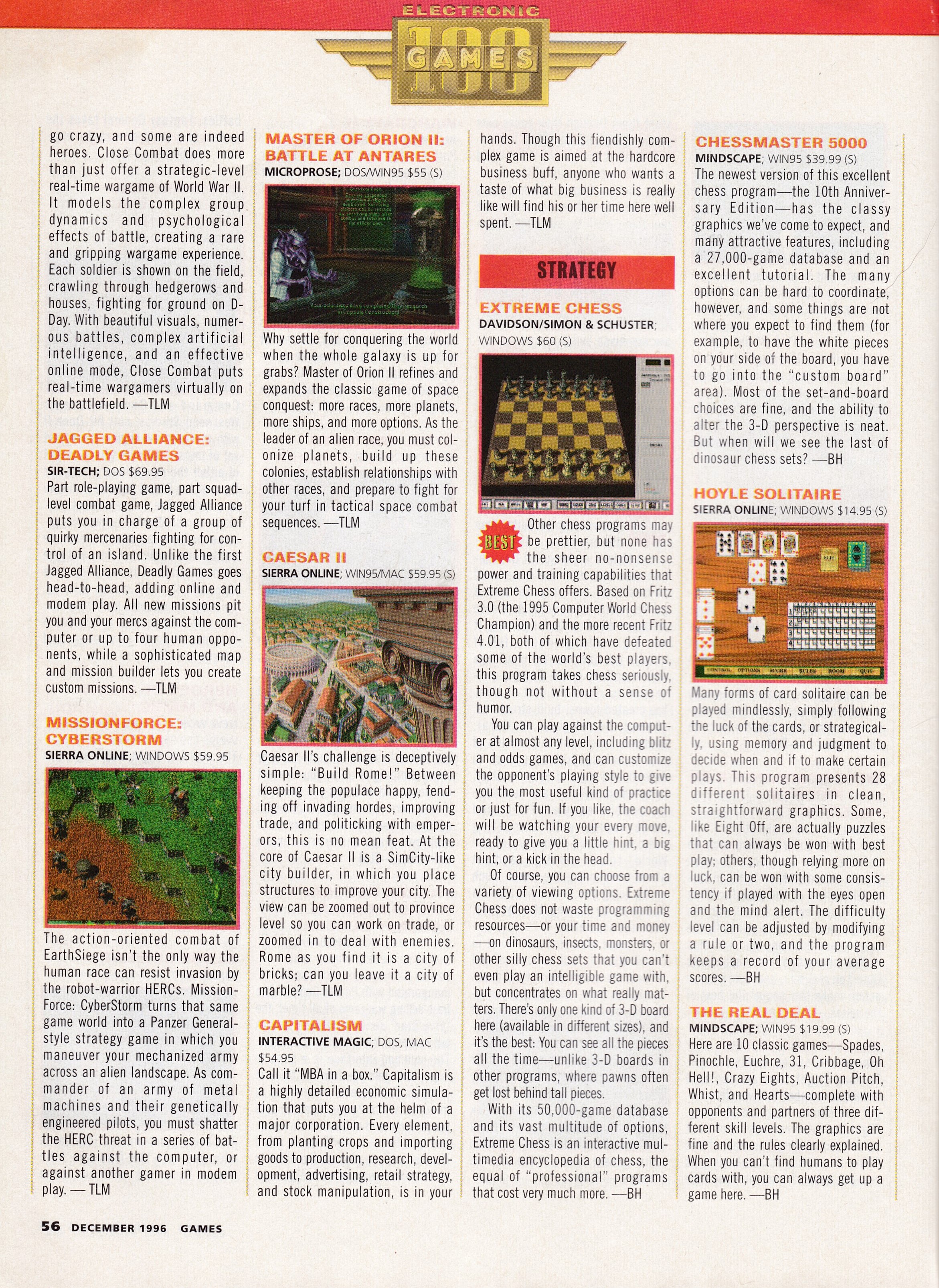
Then we have Strategy. To which Solitaire belongs.
So, to sum up: Strategy is card & board games. Conflict & Conquest is what we would consider to compose strategy today. Except for some of the war games, which are actually Simulations, but only if they concern driving a vehicle of some kind. Action Strategy is for Lemmings, Lemmings-based paintball, and mini-golf.
The corporation sim Capitalism is classified as Conflict & Conquest, but I suppose that's ultimately accurate.
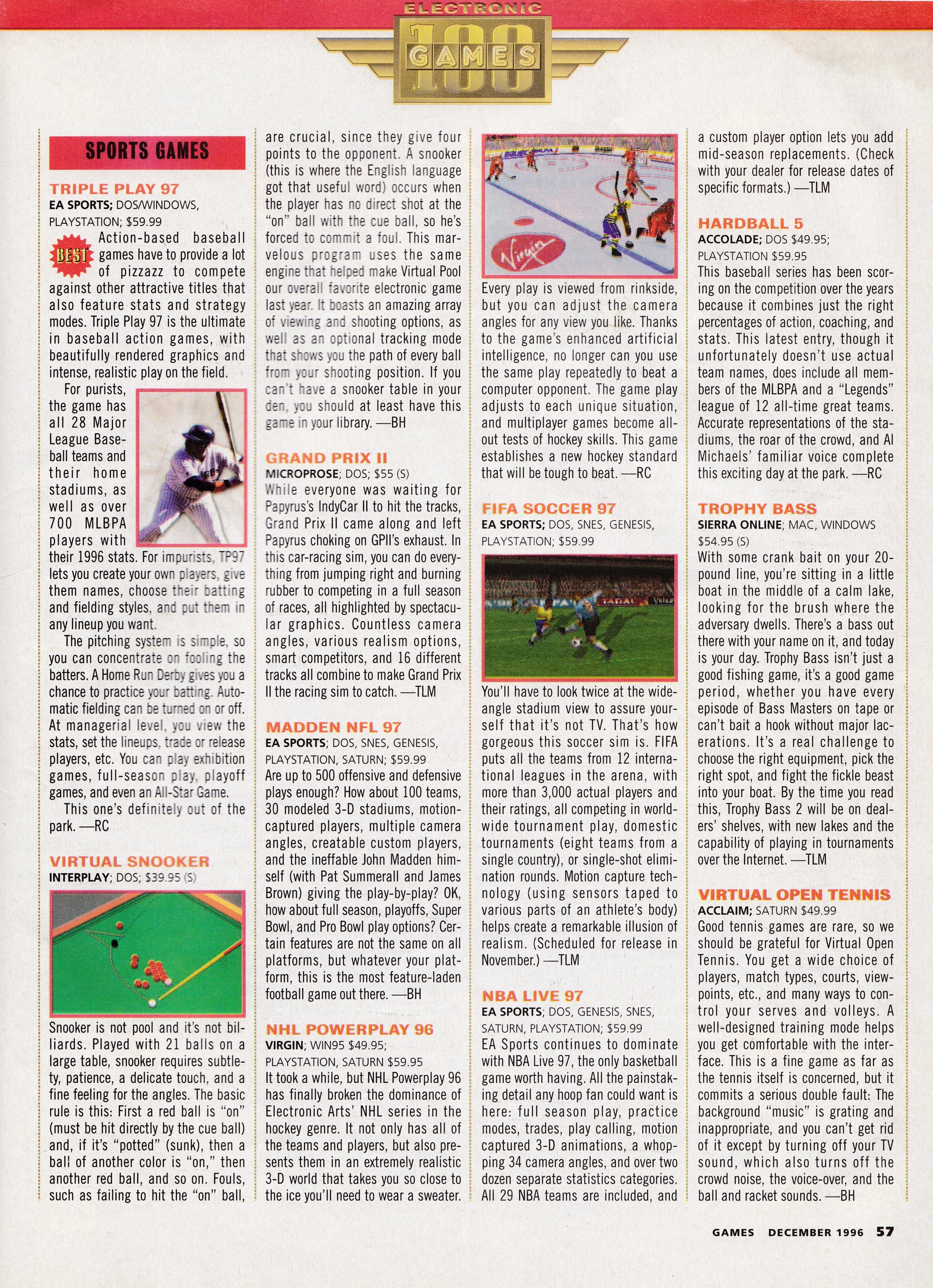
Finally, we have Sports Games, which by some miracle, actually consists of sports games. The apparent runner-up is a snooker title. The review spends most of its space trying to explain what snooker is.
And there you have it! But this ride doesn't end here, friends: I have four more rounds of GAMES Games of the Year for us to peruse. Well, three-and-a-half, more like; we have the 1994 awards, which crowned Myst Game of Any Kind of the Year and which, er, combined board and video games in its categories. That'll be up next. Stay tuned!

